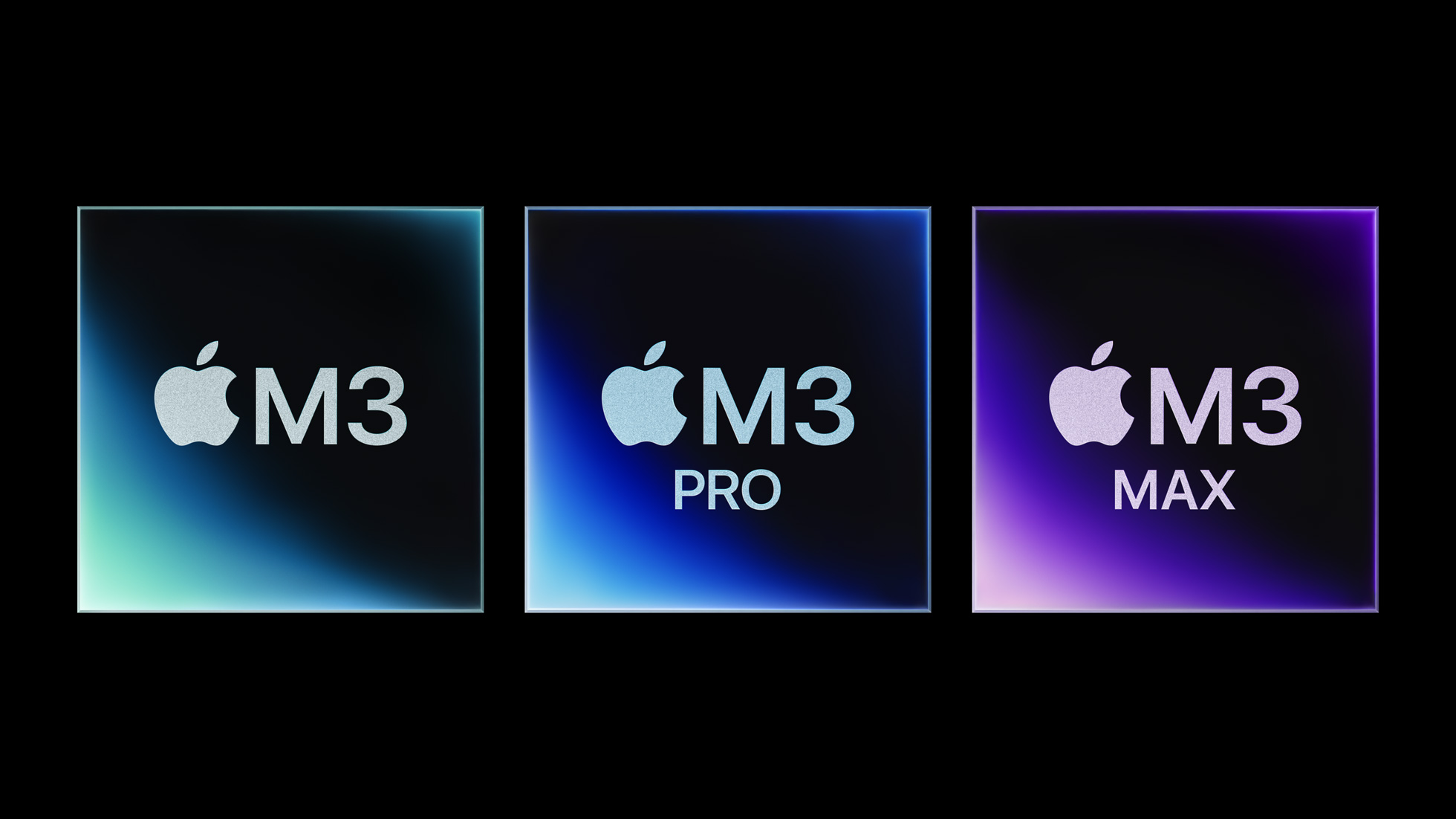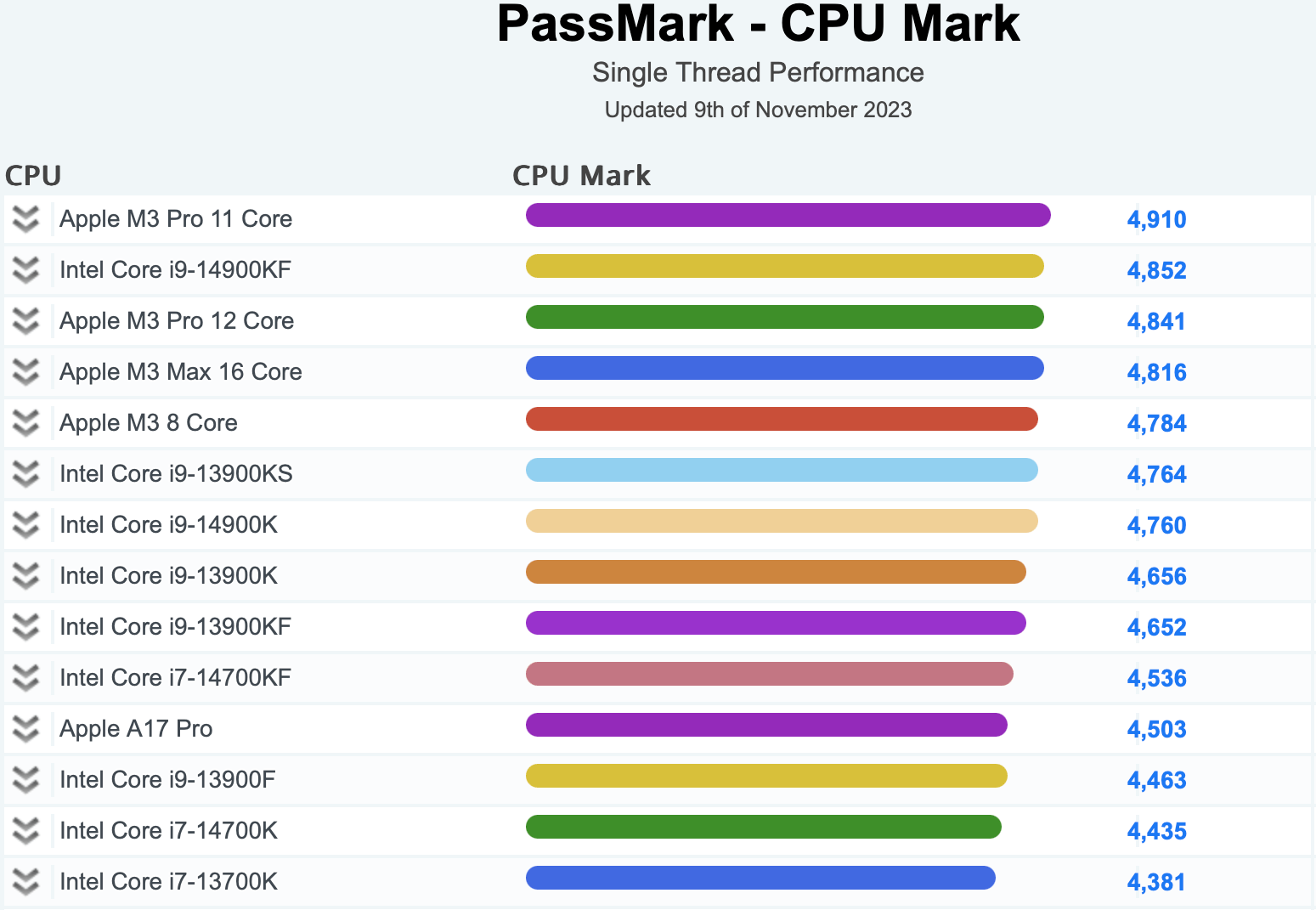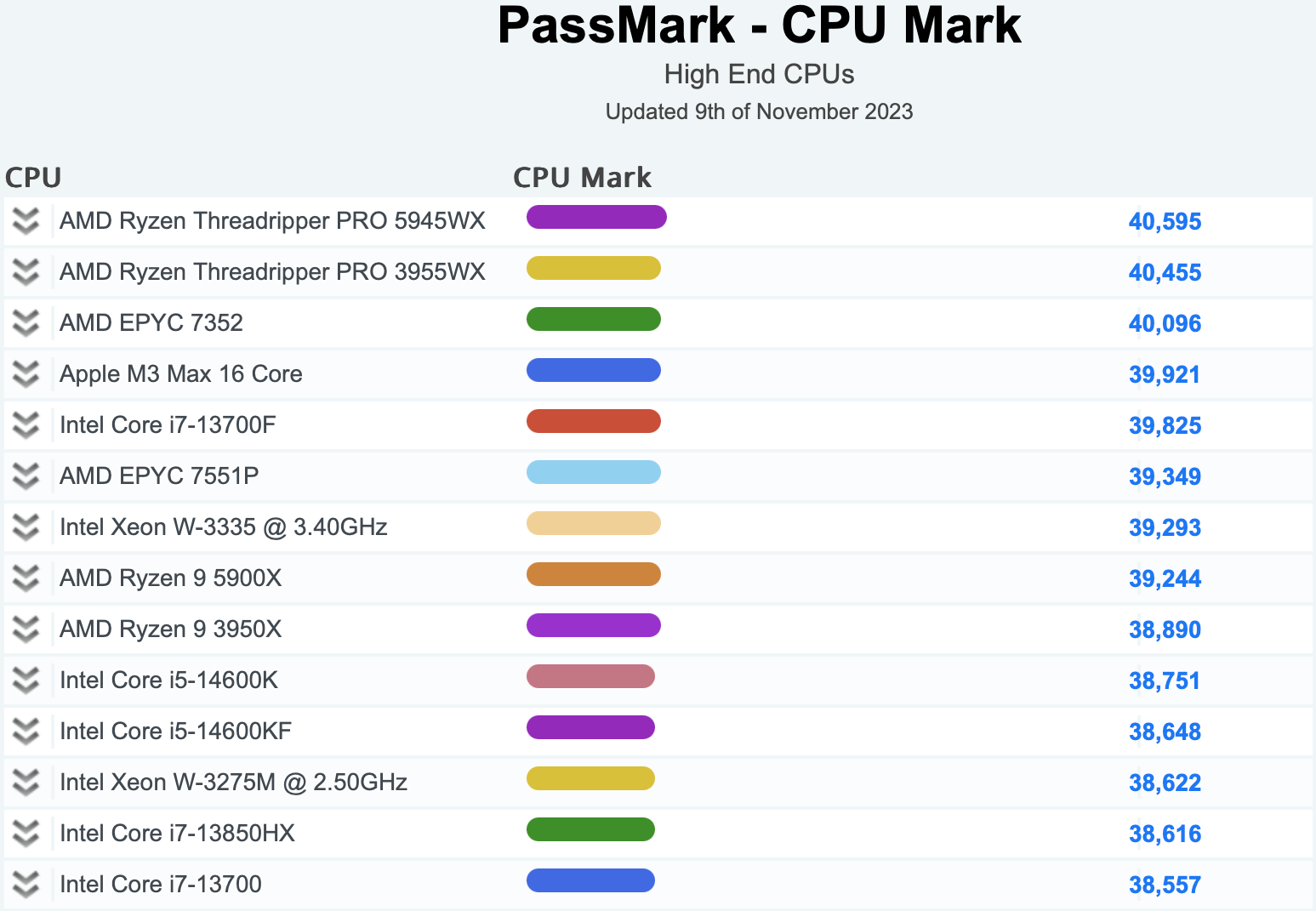Apple M3 Leads in PassMark's Single-Thread CPU Benchmark, But There is a Catch
And it's the same catch as always...

Apple's M3-series of chips have started to enter PassMark's CPU benchmark database and continued tradition of their predecessors of being ahead of all rivals in single-thread workloads. Unfortunately for Apple, its M3 Max processor does not stand a chance against flagship offerings from Intel and AMD, which are, of course, more power hungry, in multi-thread workloads.
For now, Apple's 11-core M3 Pro leads in PassMark's single-thread CPU benchmark with 4,910 points — about 1.2% faster than Intel's Core i9-14900KF with 4,852 points. Apple's M3 Pro features an eight-wide execution, a 150 GB/s memory subsystem, and a 4.05 GHz frequency, while Intel's Core i9-14900KF boasts a six-wide execution, an 89.6 GB/s memory subsystem (though most i9-based systems feature higher bandwidth as they are used with enthusiast-grade memory), and a 6.0 GHz boost clock. Apple's win seems even more impressive given that the M3 Pro is a laptop system-on-chip (SoC) with a moderate power consumption.
Apple's 12-core M3 Pro and 16-core M3 Max processors are slightly behind their younger brother, but are still ahead of Intel's 13th Generation and 14th Generation core processors. Interestingly, even Apple's smartphone-oriented A17 Pro SoC beats Intel's Core i9-13900F and Core i7-14700K in the single-thread PassMark CPU benchmark.
As far as Apple's 16-core M3 Max SoC's performance in PassMark's multi-thread CPU benchmark, it scores 39,921 points, which is enough to beat Intel's Core i7-13700F (39,825) and be more or less on par with the 20-core M2 Ultra (40,893). However, flagship desktop offerings from AMD and Intel — Ryzen 9 7950X (63,230 points) and Core i9-14900K (60,823 points) — outperform the M3 Max by 58% and 52%, respectively. Of course, these parts consume a lot more power than does Apple's M3 Max — but for those who need maximum performance, this doesn't really matter.
There might be positive news for Apple. The company's 24-core M2 Ultra system-in-package featuring two M2 Maxes shows an excellent +85% scalability compared to one M2 Max. If Apple's 32-core M3 Ultra shows similar scalability, then with around 73,000 points in multi-thread workloads in PassMark's CPU benchmark it will be able to rival AMD's 32-core Ryzen Threadripper Pro 5975WX (75,777 points) and Intel's 36-core Xeon W9-3475X (67,227 points) at a fraction of power. Yet, AMD's 96-core Ryzen Threadripper Pro 7995WX (153,301 points) and Intel's 56-core Xeon W9-3495X (98,285 points) will still be far ahead of Apple's flagship offering.
Ever since Apple released its own M-series processors for desktop and laptop computers in 2020, these SoCs have dominated single-thread performance benchmarks because of their eight-wide execution as well as an advanced caching and memory subsystem. Apple's M3 can still beat everything in single-thread workloads, but when it comes to performance in multi-threaded workloads that use all the cores and power that they can possibly get, Apple's processors lag behind their rivals severely.
Get Tom's Hardware's best news and in-depth reviews, straight to your inbox.

Anton Shilov is a contributing writer at Tom’s Hardware. Over the past couple of decades, he has covered everything from CPUs and GPUs to supercomputers and from modern process technologies and latest fab tools to high-tech industry trends.
-
Alvar "Miles" Udell Question: Why does this article exist? There's already a TH article on an M3 based Macbook Pro (which is sadly deficient in the software test department) and a TG article on the M3 iMac (which again is sofware deficient, only including Geekbench and Handbrake), and Passmark is as irrelevant test as ADIA64's CPU benchmarks (which nobody pays attention to) or CPU-Z's CPU benchmark (which nobody pays attention to), or userbenchmark (which lies and nobody cares about).Reply
https://www.tomshardware.com/laptops/apple-16-inch-macbook-pro-late-2023
https://www.tomsguide.com/reviews/apple-imac-m3 -
Amdlova People who compare mac with other hardware have in the playlist "Gillette - Short, Short Man"Reply -
bit_user ReplyApple's M3 Pro features an eight-wide execution ..., while Intel's Core i9-14900KF boasts a six-wide execution
This is only the rate at which instructions are dispatched by the decoders. The actual amount of concurrency is usually higher. Another good metric to look at is how many instructions can be retired per cycle.
It's not all about width, either. Apple's cores also feature deeper reorder buffers (640 entries, in the M1) than Intel (512 entries, in Golden Cove) or AMD (384 entries, in Zen 4). -
bit_user Reply
It's news. The benchmark result wasn't known by the aforementioned review.Alvar Miles Udell said:Question: Why does this article exist?
So, we can't have additional news coverage of a product, after it's been reviewed? I wouldn't like that.Alvar Miles Udell said:There's already a TH article on an M3 based Macbook Pro (which is sadly deficient in the software test department)
If you have information on the quality of Passmark and how it does or doesn't correlate with application performance, I'd be interested in seeing it.Alvar Miles Udell said:Passmark is as irrelevant test as ADIA64's CPU benchmarks (which nobody pays attention to) or CPU-Z's CPU benchmark (which nobody pays attention to), or userbenchmark (which lies and nobody cares about).
Regardless, I think it's interesting to see a case where the M3 Pro can overcome it's 33% clockspeed deficit to slightly edge out the latest & greatest incarnation of Golden Cove. Nobody is making you read the article (or comment on it).
I like coverage of advancements in CPUs (among other things). I think it's interesting to follow Apple's progress, even though I'm not a Mac user, because it can tell us certain things about ARM, TSMC N3B, what we might reasonably expect from Qualcomm's upcoming laptop SoCs, etc. -
JeffreyP55 Reply
No apple anything since my workshop in 1994. Believe it was an Motorola 68030 CX.Admin said:Apple's M3 Pro is Ahead of Intel's Core i9-14900KF in PassMark single-thread CPU benchmark, but gets destroyed in multi-threaded workloads.
Apple M3 Leads in PassMark's Single-Thread CPU Benchmark, But There is a Catch : Read more
I did love my Amiga's. Had many at home and at work. -
JeffreyP55 ReplyJeffreyP55 said:No apple anything since my workshop in 1994. Believe it was an Motorola 68030 CX.
I did love my Amiga's. Had many at home and at work. Apples are niche computers. Apples are best suited for A/V applications. -
Alvar "Miles" Udell ReplyIt's news. The benchmark result wasn't known by the aforementioned review.
Except it was. Senior Editor Brandon Hill could have seen the result if he ran the Passmark software for his article.
So, we can't have additional news coverage of a product, after it's been reviewed?
Keyword being "news". Just because there's a benchmarking program that generates a number doesn't mean it's news and needs to be included in any test, much less its own article. Now if the article were about Blender, Final Cut Pro, or other such software then that's noteworthy news. The PugetBench PhotoShop test (as run by TG's editor in chief on the M2 and two competitor Windows machines) is equally valid, as well as gaming tasks.
If you have information on the quality of Passmark and how it does or doesn't correlate with application performance, I'd be interested in seeing it.
Are you saying Passmark is completely reliable and should be included in every article going forward? I don't think you are, considering TH doesn't do it on any CPU or GPU test, nor does Techpowerup, Techspot, or any other reputable tech site, because it's just a program that generates a number that doesn't necessarily reflect real world usage and results, no more than 3DMark or PCMark does.
Using the Passmark numbers, the M3 Max is 34% faster than the M2 Max, yet in the more realistic Handbrake test it was only 26% faster than the M2 Max, a significant difference considering the M3 Max has 25% more cores. The M3 Max scored 41% higher in the Passmark test than the 13700H used in the review article, yet again in handbrake test it was 51% faster. -
bit_user Reply
That's a different request. You could've commented on that review, requesting to run that benchmark.Alvar Miles Udell said:Except it was. Senior Editor Brandon Hill could have seen the result if he ran the Passmark software for his article.
IMO, it is when a new CPU is able to overcome a 33% clockspeed deficit to pull out a single-threaded win. That definitely ranks it as newsworthy.Alvar Miles Udell said:Keyword being "news". Just because there's a benchmarking program that generates a number doesn't mean it's news
Well, again, it's right in the headline that it's not one of those. So, if you don't care about things other than application benchmarks, then you can simply skip past it to articles that do interest you.Alvar Miles Udell said:Now if the article were about Blender, Final Cut Pro, or other such software then that's noteworthy news.
For instance, I have no interest in 3D printing. So, what do I do when I see an article about 3D printing on this site? That's right - I skip past it and look for other articles that do interest me. I never once complained about the site's 3D printing coverage, though.
I'm not the one issuing the complaint. If your complaint is that it's irrelevant, then I would hope you have some data to support that complaint.Alvar Miles Udell said:Are you saying Passmark is completely reliable and should be included in every article going forward?
I don't know that, and apparently neither do you.Alvar Miles Udell said:it's just a program that generates a number that doesn't necessarily reflect real world usage and results, no more than 3DMark or PCMark does.
The M3 Max has a 12 + 4 configuration (total: 16), while the M2 Max has a 8 + 4 configuration (total: 12). By my math, that's 33.3% more total cores, while actually being 50% more P-cores. The reason Handbrake scales worse than that could be that it's memory bottlenecked (the memory bandwidth reportedly did not increase) or that its scalability is somewhat algorithmically constrained.Alvar Miles Udell said:Using the Passmark numbers, the M3 Max is 34% faster than the M2 Max, yet in the more realistic Handbrake test it was only 26% faster than the M2 Max, a significant difference considering the M3 Max has 25% more cores. -
gg83 Reply
Especially with the lower power consumption. Do you think x86 will ever win at the low power window?bit_user said:It's news. The benchmark result wasn't known by the aforementioned review.
So, we can't have additional news coverage of a product, after it's been reviewed? I wouldn't like that.
If you have information on the quality of Passmark and how it does or doesn't correlate with application performance, I'd be interested in seeing it.
Regardless, I think it's interesting to see a case where the M3 Pro can overcome it's 33% clockspeed deficit to slightly edge out the latest & greatest incarnation of Golden Cove. Nobody is making you read the article (or comment on it).
I like coverage of advancements in CPUs (among other things). I think it's interesting to follow Apple's progress, even though I'm not a Mac user, because it can tell us certain things about ARM, TSMC N3B, what we might reasonably expect from Qualcomm's upcoming laptop SoCs, etc.

